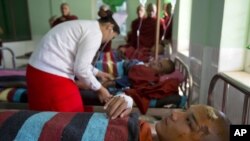Opposition leader Aung San Suu Kyi visited Letpadaung mountain in upper Burma today to talk to villagers where a Chinese copper mine has caused a land rights dispute between farmers and the Burmese government. The government attacked protesters at the proposed area of expansion of the mine, leaving several monks injured.
Riot police early Thursday moved in to disperse protesters at three camps at the Letpadaung copper mines, near Mandalay in upper Burma. Injured monks and villagers who retreated to a nearby monastery the following morning were seen with singed robes and skin. But the president's office issued a statement denying it used chemical weapons.
A witness on the scene, says at least 23 monks were injured, one critically. Ten are missing and six were arrested.
"Security forces raided the camp," reported the witness. "A lot of Buddhist monks they throw first with the water cannon and then they throw with the smoke bomb. So they burned down the whole camp, six camps, and so the Buddhist monks and other local activists, they dispersed."
Aung San Suu Kyi, a member of the parliament's rule of law committee, had planned a visit to the mine after parliament passed a motion to investigate the impact of the mines on villagers. Her spokesperson, Ohn Kyaing, says she plans to meet with protest organizers as well.
"They suffered economically and socially and other environmental disasters for that project so our leader would like to see the depth of that impact and she wants to hear from the villagers the real situation from the villagers and then she will, she is the chairman of the rule of law and peace committee of parliament she will make some recommendations to the committee what to do," said Ohn Kyaing.
Myint Twin is a lawyer who has been working with the villagers in Monywa to navigate their demands through the courts. He says every member of parliament should know the difficulties of the civilians, so they can bring this case to parliament where there is hope to seek some sort of satisfying resolution.
In the past, grassroots efforts have successfully stopped Chinese joint venture infrastructure projects such as the Myitsone dam. But Beijing has pressed on with the project, despite protests at its embassy in Rangoon.
In a media briefing this week, Chinese Foreign Ministry spokesman Hong Lei confirmed the government had no plans to halt the expansion of the mine.
He says the relevant copper mine is a mutually beneficial cooperation project between China and Burma. The relocation compensation, benefits distribution and environmental protection involved in this project have been jointly decided by the two sides. He says these decisions are also in compliance with Burma’s laws and regulations. And he hopes that all sectors of Burma will create favorable conditions for the successful operation of the project.
Other protesters connected to the mine protest were arrested earlier in the week, and are awaiting trial.
Riot police early Thursday moved in to disperse protesters at three camps at the Letpadaung copper mines, near Mandalay in upper Burma. Injured monks and villagers who retreated to a nearby monastery the following morning were seen with singed robes and skin. But the president's office issued a statement denying it used chemical weapons.
A witness on the scene, says at least 23 monks were injured, one critically. Ten are missing and six were arrested.
"Security forces raided the camp," reported the witness. "A lot of Buddhist monks they throw first with the water cannon and then they throw with the smoke bomb. So they burned down the whole camp, six camps, and so the Buddhist monks and other local activists, they dispersed."
Aung San Suu Kyi, a member of the parliament's rule of law committee, had planned a visit to the mine after parliament passed a motion to investigate the impact of the mines on villagers. Her spokesperson, Ohn Kyaing, says she plans to meet with protest organizers as well.
"They suffered economically and socially and other environmental disasters for that project so our leader would like to see the depth of that impact and she wants to hear from the villagers the real situation from the villagers and then she will, she is the chairman of the rule of law and peace committee of parliament she will make some recommendations to the committee what to do," said Ohn Kyaing.
Myint Twin is a lawyer who has been working with the villagers in Monywa to navigate their demands through the courts. He says every member of parliament should know the difficulties of the civilians, so they can bring this case to parliament where there is hope to seek some sort of satisfying resolution.
In the past, grassroots efforts have successfully stopped Chinese joint venture infrastructure projects such as the Myitsone dam. But Beijing has pressed on with the project, despite protests at its embassy in Rangoon.
In a media briefing this week, Chinese Foreign Ministry spokesman Hong Lei confirmed the government had no plans to halt the expansion of the mine.
He says the relevant copper mine is a mutually beneficial cooperation project between China and Burma. The relocation compensation, benefits distribution and environmental protection involved in this project have been jointly decided by the two sides. He says these decisions are also in compliance with Burma’s laws and regulations. And he hopes that all sectors of Burma will create favorable conditions for the successful operation of the project.
Other protesters connected to the mine protest were arrested earlier in the week, and are awaiting trial.





